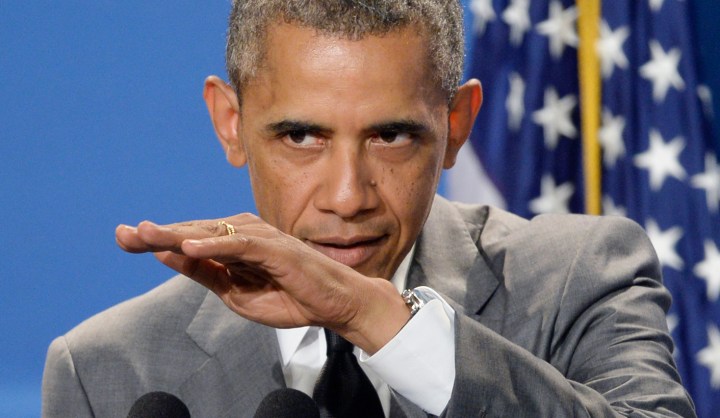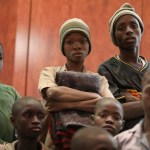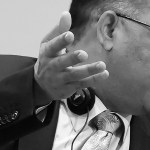World
Obama’s ISIS gambit for dangerous times and dangerous people

Even before President Barack Obama even got a chance to deliver his speech about how the US is going to deal with Islamic State (IS), former Vice President Dick Cheney got out a belligerent, ‘fight everyone in the neighbourhood’ rebuttal speech to an adoring claque at the American Enterprise Institute in Washington. Politics can be a vicious business. J. BROOKS SPECTOR is not surprised.
It has been nearly six years since Vice President Dick Cheney skulked his way out of town, growlin’ and a scowlin’ that America under his leadership (well, okay, he was only the vice president, but everyone knew he was the real strategist in the room) had held back the forces of chaos and calamity, and the Bush administration was being unfairly maligned for tackling its herculean tasks. Since then, Cheney has occasionally come back out of his lair to offer up a bit of retrospective historical rewriting and some snarling criticism of the current administration’s policies of withdrawing from Iraq and Afghanistan, but this time seems to have reached a new low.
Creating a new form of political protest, hours before the president spoke on television, Cheney gave a speech at the American Enterprise Institute (AEI), a leading home base for the defence-heavy, neoconservative, internationalist, interventionist Republican core – a speech that has been labelled a “pre-buttal”. In effect, Cheney tackled Obama’s Wednesday evening television address on his strategy towards IS even before the Obama speech had actually happened. Washington being what it is, of course, the broad outlines of the president’s speech were already widely known, and the key points of much of Cheney’s critique had already been previewed in the writings of some columnists. For Cheney, speaking at AEI, he had an audience that was like a convention of the faithful, back from exile and getting ready to break out the weapons and do battle once again, one more time. More on Cheney’s speech in a minute, but first must be a précis of the president’s speech.
One has to feel for Barack Obama at this point in his administration. Maybe the fault isn’t in his stars as the Bard had reminded the Roman plotters in Julius Caesar, but Obama must certainly be wondering what happened to those early dreams of rebuilding the country’s spirit and structure, back when he first took office on 20 January 2009. When he entered the White House, the plan was to extract the military from its fool’s errands in Iraq and Afghanistan, hold back the impending financial collapse, then reignite the economy, and thereafter rebuild its infrastructure for a strong, sustained run against America’s new international economic competitors. But that was then, and this is now.
While the economy has actually been slowly recovering to a position of health (effectively minus the disastrous property bubble) with unemployment at around 6.1%, his big accomplishment domestically was the Affordable Care Act. But that must seem like a world away by now. And the capstone foreign policy achievement of those large-scale troop withdrawals and the repositioning of foreign policy attention towards the rising powers like China has been largely overwhelmed by the on-going – indeed, increasing – chaos across a wide swathe of the Middle East.
As the force withdrawal from Iraq drew to a completion, the Arab Spring broke out but then soured; Iraq’s national cohesiveness melted away into its constituent, hostile parts; and then the gruesome – and increasingly confusing – Syrian civil war broke out as well. Almost exactly year ago, the Obama administration wanted to draw that infamous “red line” in the sand against Bashar Al-Assad’s Syria over his government’s use of poison gas against its population (as well as its attacks on rebel forces). However, on that occasion, Obama had been unable to rally Congress to offer a full endorsement of any form of attack on Syria, and neither was the British Prime Minister David Cameron.
Now, with the ascendancy of the IS regime across northern Iraq and eastern Syria and its barbaric behaviour against ethnic and religious minorities, its executions of Iraqi military personnel who had surrendered, and, most recently, its public beheadings of two American journalists, the president was increasingly forced to act – or at least react. In a speech that – ironically – was delivered the evening ahead of the thirteenth anniversary of the 9/11 terror attacks on the Twin Towers and Pentagon, Obama set out a strategy for dealing with IS, noting that it would not be a quick, easy solution.
Instead of an all-out invasion, the Obama strategy had a distinctly limited ambit. Nevertheless, it would include a systematic campaign of air strikes against IS targets “wherever they are”, including in Syria; increased support for allied ground forces fighting against IS – but not Assad of Syria; more counter-terrorism efforts to cut off the group’s funding and help stem the flow of fighters into the Middle East; and continuing humanitarian assistance to the civilians affected by the IS advance.
As part of this, there will be increased training and support to fighters opposing IS (and Al-Assad’s government at the same time – a real complexity in this conflict) as well as American personnel for training and support up to the level of around 475 sets of boots on the ground. As Obama said in his speech, “Working with the Iraqi government, we will expand our efforts beyond protecting our own people and humanitarian missions, so that we’re hitting ISIL targets as Iraqi forces go on the offense.” Obama said he would welcome congressional approval for the fight against IS, but added he had the authority to act, even without it. Ensuring extra funding for all of this is a slightly different matter – and Congress is going to be asked – and expected – to come up with the cash.
Up until his speech, the US had already carried out around 150 air strikes against IS in Iraq – and the mandate now is to carry out air strikes into IS-controlled territory in Syria as well. In the meantime, Secretary of State John Kerry has been on the road again to the Middle East rallying a “broad coalition to roll back” IS as he met with counterparts from key Arab nations and Turkey in Jeddah, Saudi Arabia. Media reports say the Saudis have agreed to serve as a base for further training for anti-IS forces and the latest word is that 10 Arab nations have now given their support to the Obama administration in this mission.
Even as Obama set out his framework for action, he felt the need to be very careful about what this is not going to be about. As he said, “We will not get dragged into another ground war.” Instead, he argued that the country is going to assemble a broad coalition to push back that terrorist threat. However, he put down two cautionary notes – the first was how long things would take until someone can quietly whisper, “mission accomplished”, as well as the fact that there were real risks to the lives of any US military personnel involved. In almost any conceivable projection, by doing this, the Obama administration has now put a burden on whoever comes in as president in 2016 for finishing this nasty bit of work. This must be a particularly bitter irony for a president whose initial run for that office had been to liquidate a previous president’s overreach in Iraq and Afghanistan.
In finally making this decision, besides those competing international crises in Gaza and Ukraine, the US president has had to confront the domestic political context of this anti-IS strategy as well. While the public tenor has been clear for years that there is very little support for vast new military adventures in the wake of the Iraqi debacle, the highly visible behaviour of IS has begun to alter public perceptions somewhat.
For example, the newest Pew Research Centre survey report – conducted just prior to the president’s 10 September speech – noted, “the public has become more worried about Islamic extremism. Six-in-ten (62%) are very concerned about the rise of Islamic extremism around the world, which is the largest share dating back to 2007. A somewhat smaller majority (53%) is very concerned about the possibility of rising Islamic extremism in the US, which ties a record high. The new national survey by the Pew Research Centre, conducted 2-9 September among 2,002 adults, finds that ratings of the government’s job in reducing terrorism have worsened since late last year. Roughly four-in-ten (42%) say the government is doing ‘not too well’ or ‘not at all well’ in reducing the terror threat, up 16 points from November.
“While the new survey does not ask about ISIS specifically, 67% last month identified the militant group in Iraq and Syria as a ‘major threat’ to the US. The survey also finds a shifting balance between concerns about civil liberties and protection from terrorism. In a reversal from last year after Edward Snowden’s NSA leaks, 50% today say they are more concerned that government anti-terrorism policies have not gone far enough to protect the country, while 35% are more concerned that the policies have gone too far in restricting civil liberties.”
However, there is, so far, little change in any visible support for major troop commitments, despite a sense the threat levels in the world are rising and that still more must be done – and this is the contradictory, cross-cutting political universe the president has had to cope with in confronting IS. Moreover, the US is facing a mid-term election in less than two months’ time and some Republican critics are charging the president’s policies offer too little, while yet others are warning he is pushing that old, largely discredited interventionist agenda again (sort of George W Bush-lite). And among Democrats, where much of the president’s original support had come from people strongly opposed to the Iraq and Afghan wars, while some are calling for more stringent action, perhaps a majority of his co-Democrats remain uneasy about anything that even begins to look like a twitch towards that old interventionist instinct.
As if to quantify this ambivalence, in a survey released at the end of last month, the Pew folks noted, “As the public’s views of global threats have changed, so too have opinions about America’s role in solving world problems. On balance, more continue to think the United States does too much, rather than too little, to help solve world problems. But the share saying the US does too little to address global problems has nearly doubled – from 17% to 31% – since last November, while the percentage saying it is doing too much has fallen from 51% to 39%.”
Meanwhile, let’s go back to Darth Vader, er, Dick Cheney, as he attempted to pre-emptively undermine the president’s pitch and put some backbone into his party to demand a still-stronger response. Thundering away, Cheney said, “The situation is dire, and defeating these terrorists will require immediate, sustained, simultaneous action across multiple fronts… We should immediately hit them in their sanctuaries, staging areas, command centres and lines of communication wherever we find them… We are at war [and] we must do what it takes, for as long as it takes, to win.” Per Cheney, this now means, “we should halt the drawdown of our troops in Afghanistan,” that we should “take military action if necessary” in Iran, and give “full backing and support” of those fighting the Muslim Brotherhood. One has to wonder just how many battlefronts Cheney thinks are needed at any given time in order to show sufficient resolve and determination.
Commenting on Cheney’s near-apocalyptic posture, Washington Post columnist Dana Milbank wrote, “Cheney’s 20-minute speech, carefully read from his prepared text, had an I-told-you-so tone. He mockingly said it was ‘nice to hear’ Obama’s recent remark that the post-9/11 security apparatus keeps us safe, ‘especially from someone who used to speak so disparagingly about the steps we took.’ Of course, it could be argued that the spread of jihadist movements has less to do with Obama than with destabilisation caused by the Bush-Cheney wars. But Cheney, so expert on Obama’s failings, remains blind to his own. ‘A policy of non-intervention can be just as dogmatic as its opposite,’ he said, ‘and this president has seemed at times only more sure of himself as he is disproved by events.’ A sense of self-awareness would have led Cheney to drop that line.”
Indeed, this may well be true, but this holier-than-thou-ism is, nevertheless, a part of the political universe the Obama administration must operate in. That universe includes these on-going efforts to respond to IS; to manage to move through the complex collection of combatants in Syria; to stave off the spread of IS-borne chaos; and to manage, simultaneously, to avoid having this newest military engagement somehow inflame yet another part of the Middle East. DM
For more, read:
-
Growing Concern about Rise of Islamic Extremism at Home and Abroad at the Pew Centre
-
As New Dangers Loom, More Think the US Does ‘Too Little’ to Solve World Problems at the Pew Centre
-
Obama: US chasing ISIL ‘wherever they exist’ at Politico
-
Islamic State crisis: Obama threatens action in Syria at the BBC
-
Cheney in Wonderland – Sure, a lot of people can criticize Obama’s foreign policy. But the former veep doesn’t have the credibility to do so at Politico
-
9/11 and the future of US foreign policy: A speech by Vice President Richard B Cheney at the AEI website.
Photo: US President Barack Obama delivers remarks at the White House Summit on Working Families, in Washington DC, USA, 23 June 2014. The first-ever White House Summit on Working Families was held to discuss flexible workplace policies beneficial to working parents and employers. EPA/MICHAEL REYNOLDS.



















